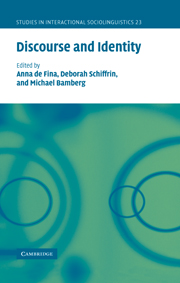Book contents
- Frontmatter
- Contents
- List of contributors
- Introduction
- Part I Overview: theory, method and analysis
- Editors' introduction
- 1 Narrative and identity: the double arrow of time
- 2 Footing, positioning, voice. Are we talking about the same things?
- 3 Small and large identities in narrative (inter)action
- 4 From linguistic reference to social reality
- Part II Private and public identities: constructing who we are
- Part III The gendered self: becoming and being a man
- Part IV The in-between self: negotiating person and place
- References
- index
1 - Narrative and identity: the double arrow of time
Published online by Cambridge University Press: 09 November 2009
- Frontmatter
- Contents
- List of contributors
- Introduction
- Part I Overview: theory, method and analysis
- Editors' introduction
- 1 Narrative and identity: the double arrow of time
- 2 Footing, positioning, voice. Are we talking about the same things?
- 3 Small and large identities in narrative (inter)action
- 4 From linguistic reference to social reality
- Part II Private and public identities: constructing who we are
- Part III The gendered self: becoming and being a man
- Part IV The in-between self: negotiating person and place
- References
- index
Summary
Introduction
The metaphor of the ‘double arrow of time’ points to the problem I wish to explore in this paper, namely, the implications for research and theory about identity development of two contrasting approaches to the functions of temporal order in narratives: clock/chronological vs. narrative/experiential models of time. In discussing this problem, I will draw primarily on my studies of life history interviews with craftartists and sexual abuse survivors. I will argue that more is at stake for narrative theory and research in the choice made between these two models of time than the specification of narrative structure. And, as well, that the differences are consequential for theory and research on human development, raising questions, for example, about research strategies that rely on a clock-time view of causality and on prediction as a criterion of adequacy for such studies. Further, the alternative narrative-time model underlines the importance of context in the production of narratives by showing how temporal ordering is a function of both cultural preferences for well-formed stories and the situated nature of storytelling, for example, whether elicited in interviews or expressed in the course of naturally occurring conversations. Thus, addressing problems of time and temporal order leads us to general and complex issues about relationships between context, structure, and function in narrative studies of identity.
- Type
- Chapter
- Information
- Discourse and Identity , pp. 30 - 47Publisher: Cambridge University PressPrint publication year: 2006
- 54
- Cited by



